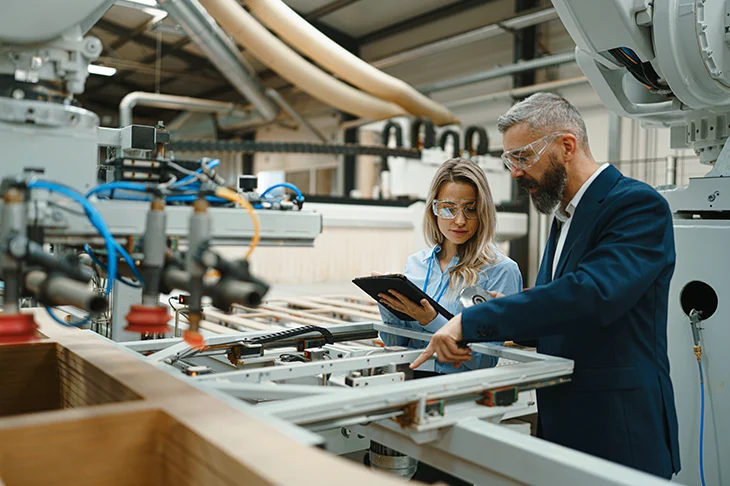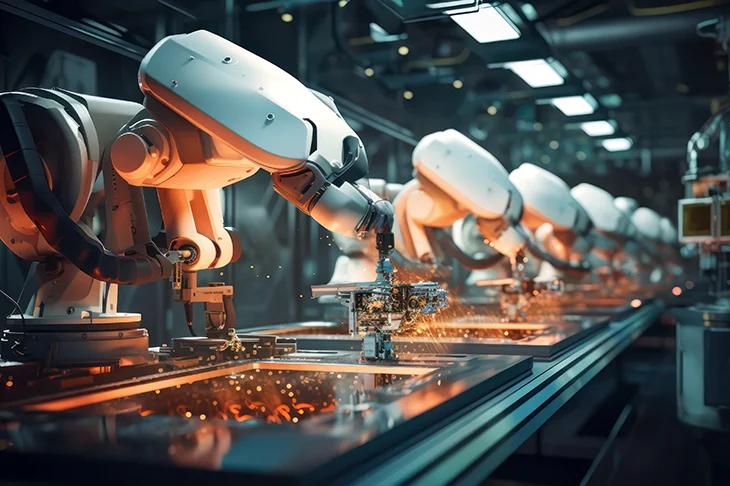- Perspective
How do we energise and accelerate a regenerative approach to future industrial development?
Hannover Messe, the world’s largest industrial exhibition kicked off this week in Germany. And this year, the theme focused on how to energise a sustainable industry – a subject that has piqued our interest here at Wyatt International.

As an agency that blends strategy with activation, we’re driving change across the industrial, manufacturing and construction sectors, supporting specialist B2B brands accelerate a sustainable advantage. With our collective ambitions so aligned, Mark Fones, our Managing Director, has delved deeper into the detail, exploring key event objectives, messages, and the latest technologies gripping the sector.
A new ambition for the industrial sector.

Industry 4.0 – or the ‘fourth industrial revolution’ – is a concept we’ve been aware of for some time. The objective is to transform the sector through digitisation, drawing on data and connectivity, advanced manufacturing technology and automation. But at the dawning of this new objective, I don’t believe the sector – in its entirety – nor any of the supply chain, were truly ready to embrace digitalisation. Some brands now have, some have tried and neglected the cause, and some are still to begin.
This is echoed in a report by McKinsey that states as of late 2020, “74 per cent of surveyed companies reported being in pilot purgatory.” This is an unfortunate, but understandable situation to be caught in. Whilst most industrial and manufacturing businesses believe in the Internet of Things and the economic potential, the projects are proving difficult to scale. Why is this? Did we think announcing Industrial 4.0 would be enough to light the match? At a time of perpetual kindling, do we need more reasoning, or something more urgent to embrace digitisation?
This is something that was explored at Hannover Messe. Andrew Waller, Sales Direct EMEA, Energy at Analog Devices has spoken about the ‘convergence of Industry 4.0 and the decentralised, clean energy grid’. The crux of the talk is such: in 2050, the world will need twice the energy we use today if we maintain our current consumption trends.
It begs the question: why can’t consumption be a good thing?
Andrew states: “Utilising technologies that manage, convert, and store energy can enhance energy efficiency, optimise energy usage, facilitate the smooth integration of renewables, and improve the overall stability and reliability of a decentralised grid. Embracing these advancements can hasten the shift towards a sustainable future, promoting enhanced energy security and a cleaner, healthier world.”
AI is asking why?

Artificial Intelligence has had a stellar year. It’s ripped through our industries (and lives) at a pace unseen before. And the general feeling is that we’re worried – the humans face their demise. But is AI simply asking, why?
Why can’t AI be harnessed to unleash true technological developments and actually aid us humans in realising our sustainability objectives? After all, sustainability is digital. According to Hamburg-based IoT-Analytics, “AI is now among the top five topics for decision-makers.”
Pressing forward with this discussion is The FZI Research Center for Information Technology who will present its findings and reveal just how technology can forge a new pathway towards “a climate-friendly industry and society”.
The centre reveals insightful ways in which we can return resources back into the product cycle using robotics and AI. Driving such an idea is the “Wheel of Sustainability” concept, an initiative that seeks to bring SMEs on board to demonstrate the transformative value of developing and executing a sustainability strategy.
An industrial transformation must be regenerative.

The change must be regenerative. Our route to 2024 has been linear, never smooth, but straight all the same. Collectively we must supercharge our efforts to ensure our newest revolution is regenerative, with the ability to remain circular for many generations to come. Just one of the institutions driving this initiative is the University of Cambridge. Its Regenerative Laboratory was launched late 2023 by Professor Steve Evans and Commercial Director Ian Bamford, both of which foresee a seismic shift in focus towards regenerative manufacturing. In the next decade, they predict this will “overtake industrial sustainability as the big topic”, signifying a new era of industry and innovation.
The value of the industrial and manufacturing sectors cannot be downplayed or overlooked, they’re integral to our economic output and have one of the largest bearings on our prosperity as a society.
Just last week at the MACH Show, a report was released that revealed “The true impact of British manufacturing”, as published by The Manufacturing Technologies Association. Just to bring the subject back to the UK for a moment, the manufacturing industry contributed £518 million to the national economy, “equivalent to 23.1% of the UK’s total economy” in 2022. It also stated that for every £1 million, the sector also creates £1.8 million elsewhere in the economy.
The sheer scale and expansion of the industrial and manufacturing sectors are like no other. And now, with a further £4.5 billion Advanced Manufacturing Plan, brands have until 2030 to take advantage of such funds and embrace new strategies and propositions, develop and integrate technologies, and embrace a digitised, sustainable advantage.
The industrial and manufacturing sectors have an immense role in helping us to realise a more circular and regenerative future – not just in the UK but on a global scale. So, it’s time to embrace “the art of the possible” and ask ourselves why. Why can’t we make one small step forward today towards a circular tomorrow?

Learn more about our Accelerator consultancy
And how we support specialist international B2B brands develop ESG strategies as well as sustainable product and service portfolio propositions
